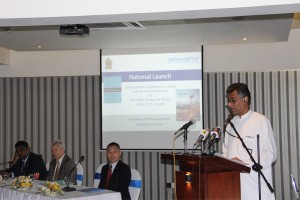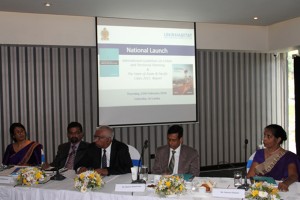UN-Habitat Launches the International Guidelines on Urban and Territorial Planning and the State of the Asian & Pacific Cities 2015 Report in Sri Lanka.
Media Release
UN-Habitat Launches the International Guidelines on Urban and Territorial Planning and the State of the Asian & Pacific Cities 2015 Report in Sri Lanka.
25 February, 2016. The United Nations Human Settlements Programme today launched two major publications in  Colombo, Sri Lanka – the International Guidelines on Urban and Territorial Planning and the State of Asian and Pacific Cities 2015 Report. The Hon. Patali Champika Ranawaka, Minister of Megapolis and Western Region Development was the Chief Guest at the event. Senior Government officials from both local and central government agencies, development professionals, donors, representatives of academia and civil society participated at the event.
Colombo, Sri Lanka – the International Guidelines on Urban and Territorial Planning and the State of Asian and Pacific Cities 2015 Report. The Hon. Patali Champika Ranawaka, Minister of Megapolis and Western Region Development was the Chief Guest at the event. Senior Government officials from both local and central government agencies, development professionals, donors, representatives of academia and civil society participated at the event.
Welcoming the participants, Mr Yoshinobu Fukasawa, UN-Habitat’s Regional Director for Asia and the Pacific, emphasized the importance of sharing the lessons learnt by Sri Lanka as an island state in its journey towards sustainable urbanisation. Addressing the gathering, Hon. Patali Champika Ranawaka spoke of the Government of Sri Lanka’s Vision towards Urban & Regional Planning. He underlined the issues related to post-colonial development in Sri Lanka and emphasized the importance of a holistic approach, considering socioeconomic and environmental aspects.
A special message from Hon. Sajith Premadasa, Minister of Housing and Construction, delivered by Mr. Susil Siriwardena, Senior Advisor to the Ministry of Housing and Construction, highlighted the importance of a bottom-up, people centred planning process. He also acknowledged UN-Habitat’s contribution towards human settlements development in Sri Lanka over the past four decades. Introductions to the two publications were provided by Mr. Rafael Tuts, Coordinator, Urban Planning and Design Branch of UN-Habitat Head Quarters and Mr. Srinivasa Popuri, Senior Human Settlements Officer of the Regional Office for Asia and the Pacific.
An interactive panel discussion, chaired by Mr.Laxman Perera, Human Settlements Officer, UN-Habitat, on the  elevance of the guidelines in the Sri Lankan context followed the publication aunch. The panel included Mr. Madhawa Waidyaratna, Additional Secretary o the Ministry of Megapolis and Western Development, Mr. Nayana awilmada, Director General, Urban Development Authority, Ms. Ramani Ellepola, Environment Consultant to Megapolis Planning Project and former Director General, Central Environmental Authority and Dr. Bilesha Weeraratne, Research Fellow, Institute of Policy Studies.
elevance of the guidelines in the Sri Lankan context followed the publication aunch. The panel included Mr. Madhawa Waidyaratna, Additional Secretary o the Ministry of Megapolis and Western Development, Mr. Nayana awilmada, Director General, Urban Development Authority, Ms. Ramani Ellepola, Environment Consultant to Megapolis Planning Project and former Director General, Central Environmental Authority and Dr. Bilesha Weeraratne, Research Fellow, Institute of Policy Studies.
The panellists highlighted several key issues including development and environmental issues arising from unplanned development initiatives and the need to develop eco zones and address issues of waste management and climate change, the importance of data analysis and sharing to facilitate planning, implementing, monitoring and evaluation, challenges of transformational planning and the current move towards an integrated approach with good governance and inclusive planning.
 The State of Asian and Pacific Cities 2015 Report, entitled ‘Urban Transformations – Shifting from Quantity to Quality’ is the second in the series, first published by UN-Habitat and the United Nations Economic and Social Commission for Asia and the Pacific (UNESCAP) in 2010/2011. The report contributes to policy-relevant literature on the region’s urban change. It highlights growing gaps between current urb anisation patterns and provides recommendations to shift to a more inclusive and sustainable urban future, in which the role of the region’s cities
The State of Asian and Pacific Cities 2015 Report, entitled ‘Urban Transformations – Shifting from Quantity to Quality’ is the second in the series, first published by UN-Habitat and the United Nations Economic and Social Commission for Asia and the Pacific (UNESCAP) in 2010/2011. The report contributes to policy-relevant literature on the region’s urban change. It highlights growing gaps between current urb anisation patterns and provides recommendations to shift to a more inclusive and sustainable urban future, in which the role of the region’s cities  is tied to national, regional and global development prospects.
is tied to national, regional and global development prospects.
The International Guidelines on Urban and Territorial Planning have been produced by UN-Habitat and are designed to fill a critical gap by providing a reference framework for planning. The Guidelines will provide national governments, local authorities and planning professionals with a global reference framework that promotes socially inclusive and better integrated and connected cities and territories that will foster sustainable urban development that will be resilient to climate change.
It is anticipated that the publications will contribute towards guiding Sri Lanka’s future planning strategies to make cities more inclusive, productive and sustainable.
